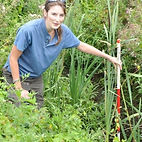
Wessex BESS Team
We are a multidisciplinary consortium of 25 scientists with different, but related, backgrounds and expertise in Ecology, Economy and Social Science. Together, our research is primarily concerned with the importance of Biodiversity for Ecosystem Services in the context of a multifunctional and dynamic landscape.
Our consortium involves people from 9 institutions (CEH Wallingford, Cranfield University, University of Exeter, University of Manchester, University of Reading, University of Lancaster, J.K. Pell Consulting and the RSPB) working together to investigate the diverse aspects of ecosystem services (i.e. Climate regulation, Water quality & supply, Pollination & pest regulation, and Cultural benefits).



Prof. James Bullock (PI)
James is the Principal Investigator and leader of the Wessex-BESS consortium, his research is mainly concerned with restoration of ecosystems and their services.
Ecologist (WP1)

Dr. Reto Schmucki
Reto's research focuses on modelling Ecosystem Services with a strong interest in estimating trade-off and synergy relationships in dynamic landscapes.
Community Ecologist (WP1)

Ms. Joanna Savage
Joanna is interested in understanding how perturbations, such as land-use change and climate change, can affect biodiversity and ecosystem function.
Field Ecologist (Field co-ordinator)

Ms. Lucy Ridding
Lucy is interested in the socio-ecological and the spatial aspects of Cultural Ecosystem Services, with a strong focus on recreational activities and PPGIS survey data.
Spatial Ecologist (WP1)

Mr. John Redhead
John's research focus on optimizing spatial modelling of ecosystem services using the InVEST tool, combining his expertise in GIS technology and ecological data.
Spatial Ecologist (WP1)

Prof. Richard Pywell
Richard is interested in plant and restoration ecologist with a strong focus on agricultural policies and it's impact on biodiversity and Ecosystem Services.
Ecologist (WP1)

Dr. Ben Woodcock
Ben is an entomologist specialising in carabids and functional diversity. His research is mainly concerned with biological control and pest regulation in crops.
Ecological Entomologist (WP4)

Dr. France Gerard
France is a specialist in Earth observation with a focus on the retrieval of vegetation parameters from optical sensors and measuring land cover dynamics in different environments.
Earth Observation (WP1)

Dr. Rob Griffiths
Rob is interested in exploring the role biodiversity of soil microbial communities and the relationships with soil function, more particularly in the impact of land use on soil ecosystem services.
Molecular microbial ecologist (WP2)

Dr. Tom Oliver
Tom is an ecological modeller interested in climate change and landscape ecology, focussing on developing rigorous indicators of ecosystem services related to biodiversity.
Landscape Ecologist (WP1)

Prof. Richard Bardgett (co-PI)
Richard's research is concerned with the roles that linkages between above ground and below ground communities play in regulating the structure and functions of terrestrial ecosystems.
System Ecologist (WP2)

Dr. Ellen Fry
Ellen's research examine how plant functional traits interact with global change to impact ecosystem function in grasslands, such as carbon stocks and fluxes, water use efficiency and soil fertility.
Community Ecologist (WP2)

Ms. Amy Hall
Amy provides essential expertise and technical support for work involving the interaction between above and below ground processes on grasslands.
Field Ecologist (WP2)

Prof. Nick Ostle
Nick's research focus on the role of plant-soil biodiversity interactions on ecosystem ecology and bio-geochemistry, with interest in the effects global change on terrestrial ecosystems.
Biogeochemist (WP2)

Dr. Iwan Jones (co-PI)
Iwan's research focuses on understanding the physical and biological interactions in freshwater ecosystems such that they can be better protected and managed in a changing environment.
Ecologist (WP3)

Dr. John Murphy
John's research focus on the response of biological community to stressors and on the development of more effective diagnostic biotic indices and freshwater bio assessment methods.
Freshwater ecologist (WP3)

Prof. Juliet Osborne (co-PI)
Juliet's research is broadly concerned with honeybee and bumblebee behavior and their ecology, her focus is in the effectiveness of bees and bumblebees at pollinating crops and wild plants.
Pollination Ecologist (WP4)

Dr. Rosalind Shaw
Ros's research is broadly concerned with plant-invertebrate interactions. Her research focuses on how grassland biodiversity can effect pollination and pest regulation in crops.
Community Ecologist (WP4)

Mr. Benjamin Phillips
Ben is a master student mainly interested in pollinator community effectiveness and in modelling the service that they provide in terms of crop pollination.
Community ecologist (WP4)

Dr. Anil Graves (co-PI)
Anil is an interdisciplinary scientist with particular interests in natural resources and agricultural land use systems, focusing on bio-economic analysis within the ecosystem services framework.
Land Use Systems (WP4)

Dr. David Parsons (co-PI)
Mathematician (WP5)

Prof. Emeritus Joe Morris (co-PI)
Joe is specialised in agricultural, environmental and natural resource economics and management, he is mainly involved in the cultural services work and advising the land use change scenarios.
Economist (WP5)

Dr. James McGinlay
Jim works on developping a robust and rigorous conceptual framework to adequately assess and quantify the importance of cultural ecosystem services.
Socio-ecologist (WP5)

Dr. Judy Pell
Judy is broadly interested in agroecology, functional biodiversity and pest control. She is particularly interested in on-farm habitat manipulation for improved pest management.
Applied Ecologist (WP2)

Dr. Richard Bradbury
Richard's research is concerned with climate change adaptation for biodiversity, trade-offs and synergies between management for conservation and for provision of other ecosystem services.
Conservation ecologist (WP5)
